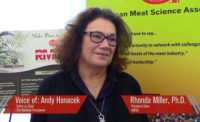[Video] AMSA Educational Foundation looks to future growth
Lauren Sammel, Ph.D., Director of AMSA, discusses 2017 initiatives including the growth of the Educational Foundation and the student board’s strategic plans for the future.
Andy Hanacek: Lauren, thanks for joining me here at IPPE 2017 near the AMSA booth. I wanted to talk to you about the strategic initiatives of 2017 for AMSA. I know there is a long laundry list that we probably can’t get to all of them, but there’s a couple that our viewers would be really interested in. One of those we can start with is an initiative around the funding of the Foundation itself. Can you talk to our viewers a little bit about what is on tap there and what the plan is moving forward?
Lauren Sammel: I’m really happy and excited to talk about what the Foundation is doing today. At this point, the Foundation has over a million dollars that has come in from today’s members. That has been supporting the different programs of the AMSA, supporting our students, and it’s what’s next. The Foundation is now working with consultants to understand how do we grow and be able to support meat science research. One of the things that I hear from academia all the time is that it is getting harder and harder to fund meat science research, and this will be a source of funding for all the different areas that are so important to our industry. So I’m really excited about the direction of where the Foundation is going and I can’t wait to see what’s next.
Hanacek: For part of these videos I’ve been doing, I talked to Dale Woerner a bit about the student programs, but I do want to talk to you about the strategic initiative that AMSA has going in terms of the students themselves and things like mentorship programs and getting more involved and different variety of colleges. What are some of the plans and ideas there that you guys have got going on?
Sammel: Since I have been serving on the board, I’ve been the liaison to the student board, and what a great group of students. I’m amazed by what they do and their passion. They are thinking very strategically of what’s next for the students and how do they continue to bring in students with diverse backgrounds from across the country so that we are building our students and developing them to go out into the industry or academia. A few of the things they are working on are mentoring sessions and developing those so that they are creating an environment where you can develop the mentorship with the professionals within the industry in a less formal setting than in the past. So at this summer’s RMC, there’s going to be more of a networking event and it’s going to create an opportunity for students to interact with a lot of people in the industry and make it a little less formal. I think that is going to be a great benefit for building those relationships that can continue throughout the years. Another thing the students are working on is a change to the way that their voting in the leadership or the students that are sitting on the student board. So they have changed the voting to ensure they are bringing in students from the East coast and the West coast to be on the board. I think it is great, because we need to be including all of the schools for diversity and this is one way they are helping to do that. Another thing is helping scholarships for travel either to the Student Leadership Conference or to RMC to some of the schools that have smaller meat science programs and to help those students get engaged, to get active and meet people. I’m really excited about the programs and how their student board is thinking strategically and what that means for the industry and what that means for students that we are developing that will be working in the industry soon.
Looking for a reprint of this article?
From high-res PDFs to custom plaques, order your copy today!




